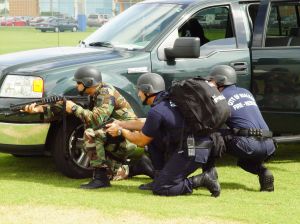 Importantly, the Penal Code does not define what an “explosive or incendiary device” is, which is a big problem in prosecuting a hoax bomb case. The legislature needs to revisit this issue and make the definitions more clear. Under 46.01(2), “‘Explosive weapon’ means any explosive or incendiary bomb, grenade, rocket, or mine, that is designed, made, or adapted for the purpose of inflicting serious bodily injury, death, or substantial property damage, or for the principal purpose of causing such a loud report as to cause undue public alarm or terror, and includes a device designed, made, or adapted for delivery or shooting an explosive weapon.” This is more specific but it is not incorporated into the hoax bomb definition or statute. It probably needs to be, so the legislature needs to diligently review this Penal Code section if it wants to make an enforceable offense. Jurors are allowed to use plain meaning to define terms that are not defined in the code, but isn’t “explosive device” and “incendiary device” a little overbroad?
Importantly, the Penal Code does not define what an “explosive or incendiary device” is, which is a big problem in prosecuting a hoax bomb case. The legislature needs to revisit this issue and make the definitions more clear. Under 46.01(2), “‘Explosive weapon’ means any explosive or incendiary bomb, grenade, rocket, or mine, that is designed, made, or adapted for the purpose of inflicting serious bodily injury, death, or substantial property damage, or for the principal purpose of causing such a loud report as to cause undue public alarm or terror, and includes a device designed, made, or adapted for delivery or shooting an explosive weapon.” This is more specific but it is not incorporated into the hoax bomb definition or statute. It probably needs to be, so the legislature needs to diligently review this Penal Code section if it wants to make an enforceable offense. Jurors are allowed to use plain meaning to define terms that are not defined in the code, but isn’t “explosive device” and “incendiary device” a little overbroad?
It appears that there certainly is little or no case against Mr. Mohamed, and the government might have a hard time legitimately prosecuting this statute if a hoax bomb as intended to be defined does pop up.
So, Mr. Mohamed, keep working on your dreams. I see a scholarship in your future if you are truly interested in engineering and science. But, any time you bring a unique device to school, let them know ahead of time so everyone is on the same page. There is certainly a level of profiling of Arab Americans and Muslim Americans since 9-11 both nationally and internationally, so you must be aware of this in your endeavors. Use your new celebrity for the good of mankind, however you see best to do so.
 Sherman & Plano, TX Criminal Defense Lawyer Blog
Sherman & Plano, TX Criminal Defense Lawyer Blog



 Irving Police based their investigation on investigation of possession of an explosive weapon or hoax bomb. When it was ruled out that the item was not an explosive weapon, possession of which would be a third degree felony, the fall back statute became possession of a hoax bomb. Texas Penal Code 46.01 defines a hoax bomb: “(13)’Hoax bomb’ means a device that: (A) reasonably appears to be an explosive or incendiary device; or (B) by its design causes alarm or reaction of any type by an official of a public safety agency or a volunteer agency organized to deal with emergencies.” Thus, anything that “reasonably appears” like an “explosive or incendiary device” warrants closer review. That’s common sense in a way, but isn’t that a broad definition. There are many things that could be considered “explosive” or “incendiary” which are not illegal. Wouldn’t a cigarette lighter meet this definition? While that might be a violation of school rules to possess, it is certainly not criminal. Why didn’t they just say “reasonably appears to be an explosive weapon”?
Irving Police based their investigation on investigation of possession of an explosive weapon or hoax bomb. When it was ruled out that the item was not an explosive weapon, possession of which would be a third degree felony, the fall back statute became possession of a hoax bomb. Texas Penal Code 46.01 defines a hoax bomb: “(13)’Hoax bomb’ means a device that: (A) reasonably appears to be an explosive or incendiary device; or (B) by its design causes alarm or reaction of any type by an official of a public safety agency or a volunteer agency organized to deal with emergencies.” Thus, anything that “reasonably appears” like an “explosive or incendiary device” warrants closer review. That’s common sense in a way, but isn’t that a broad definition. There are many things that could be considered “explosive” or “incendiary” which are not illegal. Wouldn’t a cigarette lighter meet this definition? While that might be a violation of school rules to possess, it is certainly not criminal. Why didn’t they just say “reasonably appears to be an explosive weapon”? From the Iraq war, it was learned that items as small as cell phones or even garage door openers could trigger large bombs which killed Americans. Teachers and administrators were alarmed at the look of the clock device, and called in police. They claimed Mr. Mohamed was evasive with questioning, and was detained on suspicion of a hoax bomb.
From the Iraq war, it was learned that items as small as cell phones or even garage door openers could trigger large bombs which killed Americans. Teachers and administrators were alarmed at the look of the clock device, and called in police. They claimed Mr. Mohamed was evasive with questioning, and was detained on suspicion of a hoax bomb. In Coronado v. State, the Texas Court of Criminal Appeals tackled a “scope” issue in reviewing a case of a student who was attempting to leave campus during school hours. The student claimed to be going to a relative’s funeral, but the assistant principal called his family and found this untrue. The student was also “evasive” in response to questions. The assistant principal patted down the student in an officer’s presence and found no safety risks. He then searched Coronado’s person and found $197 in currency, searched the student’s locker and the trunk of the student’s car. In the trunk, the assistant principal found cocaine, marijuana and a balance beam.
In Coronado v. State, the Texas Court of Criminal Appeals tackled a “scope” issue in reviewing a case of a student who was attempting to leave campus during school hours. The student claimed to be going to a relative’s funeral, but the assistant principal called his family and found this untrue. The student was also “evasive” in response to questions. The assistant principal patted down the student in an officer’s presence and found no safety risks. He then searched Coronado’s person and found $197 in currency, searched the student’s locker and the trunk of the student’s car. In the trunk, the assistant principal found cocaine, marijuana and a balance beam. All of us have had the experience of being called to the principal’s office. Well, most of us. Many juvenile delinquent conduct investigations begin this way, with a call and questioning by the principal, a search of a student’s locker or purse, or a pat down of a student suspected to be in contraband. Our first thought as Americans would assume that a student at a school has the same Fourth Amendment protection against unreasonable searches and seizures as an adult, but that isn’t quite so. The Supreme Court directly addressed this issue in New Jersey v. T.L.O., 469 U.S. 325.
All of us have had the experience of being called to the principal’s office. Well, most of us. Many juvenile delinquent conduct investigations begin this way, with a call and questioning by the principal, a search of a student’s locker or purse, or a pat down of a student suspected to be in contraband. Our first thought as Americans would assume that a student at a school has the same Fourth Amendment protection against unreasonable searches and seizures as an adult, but that isn’t quite so. The Supreme Court directly addressed this issue in New Jersey v. T.L.O., 469 U.S. 325. Section 15.02 of the Texas Penal Code makes criminal conspiracy a crime one level lower than the actual substantive offense. It states: “(a) A person commits criminal conspiracy if, with intent that a felony be committed: (1) he agrees with one or more persons that they or one or more of them engage in conduct that would constitute the offense; and (2) he or one or more of them performs an overt act in pursuance of the agreement…(d) An offense under this section is one category lower than the most serious felony that is the object of the conspiracy, and if the most serious felony that is the object of the conspiracy is a state jail felony, the offense is a Class A misdemeanor.”
Section 15.02 of the Texas Penal Code makes criminal conspiracy a crime one level lower than the actual substantive offense. It states: “(a) A person commits criminal conspiracy if, with intent that a felony be committed: (1) he agrees with one or more persons that they or one or more of them engage in conduct that would constitute the offense; and (2) he or one or more of them performs an overt act in pursuance of the agreement…(d) An offense under this section is one category lower than the most serious felony that is the object of the conspiracy, and if the most serious felony that is the object of the conspiracy is a state jail felony, the offense is a Class A misdemeanor.” Thus, following the shooting, the police had the right to not only arrest any person they observed shooting weapons at others, they would have the right to conduct a protective sweep of not only the outside of the restaurant, but the inside of the restaurant for persons they believed would be a continuing danger. Any person found to be in possession of a firearm would be in violation of the law if the restaurant, Twin Peaks, sells alcohol and the alcohol accounts for 51% of its revenue. Possessing a firearm, even with a conceal and carry permit, is prohibited on the premises (including the parking lot) of such locations. Any customer possessing a firearm inside the restaurant without a conceal and carry permit would also be subject to arrest.
Thus, following the shooting, the police had the right to not only arrest any person they observed shooting weapons at others, they would have the right to conduct a protective sweep of not only the outside of the restaurant, but the inside of the restaurant for persons they believed would be a continuing danger. Any person found to be in possession of a firearm would be in violation of the law if the restaurant, Twin Peaks, sells alcohol and the alcohol accounts for 51% of its revenue. Possessing a firearm, even with a conceal and carry permit, is prohibited on the premises (including the parking lot) of such locations. Any customer possessing a firearm inside the restaurant without a conceal and carry permit would also be subject to arrest. Each biker shooting at other bikers without justification could be arrested for murder or capital murder. It is capital murder in the state of Texas to unlawfully kill two people in the same criminal episode. However, none of these shooters appear to have been identified in the media. It has also been reported that the police were shooting at people they believed to be wrongfully shooting others, further complicating the scenario. Police and citizens have the right to use deadly force to defend third persons where reasonable, just like any biker present who is in reasonable fear for his life has the right to use deadly force against another to defend himself.
Each biker shooting at other bikers without justification could be arrested for murder or capital murder. It is capital murder in the state of Texas to unlawfully kill two people in the same criminal episode. However, none of these shooters appear to have been identified in the media. It has also been reported that the police were shooting at people they believed to be wrongfully shooting others, further complicating the scenario. Police and citizens have the right to use deadly force to defend third persons where reasonable, just like any biker present who is in reasonable fear for his life has the right to use deadly force against another to defend himself. Last week, all the news circled once again around a Waco, Texas law enforcement situation. Twin Peaks restaurant was apparently hosting a “biker” day, and several motorcycle clubs were in town for a meeting of a council of clubs. One Dallas lawyer said the meeting revolved around legislative issues dealing with motorcycles. However, the local police were suspicious because some groups are labeled as Outlaw Motorcycle Gangs by Texas law enforcement, and police thought the situation was ripe for explosion. One motorcycle club reportedly showed up uninvited, and a fight broke out in the parking lot. We don’t know what exactly happened, but when the shooting stopped, nine bikers were dead. Police then arrested approximately 170 bikers alleging probable cause that they conspired to commit capital murder. A judge has held each on $1 million bonds, which normally requires raising at least $100,000 in cash or other security.
Last week, all the news circled once again around a Waco, Texas law enforcement situation. Twin Peaks restaurant was apparently hosting a “biker” day, and several motorcycle clubs were in town for a meeting of a council of clubs. One Dallas lawyer said the meeting revolved around legislative issues dealing with motorcycles. However, the local police were suspicious because some groups are labeled as Outlaw Motorcycle Gangs by Texas law enforcement, and police thought the situation was ripe for explosion. One motorcycle club reportedly showed up uninvited, and a fight broke out in the parking lot. We don’t know what exactly happened, but when the shooting stopped, nine bikers were dead. Police then arrested approximately 170 bikers alleging probable cause that they conspired to commit capital murder. A judge has held each on $1 million bonds, which normally requires raising at least $100,000 in cash or other security. However, Texas’ public lewdness statute proscribes a wide range of conduct, including the consensual touching of breasts outside the clothing in public. Sec. 21.01. defines: (1) “Deviate sexual intercourse” means: (A) any contact between any part of the genitals of one person and the mouth or anus of another person; or (B) the penetration of the genitals or the anus of another person with an object. (2) “Sexual contact” means, except as provided by Section 21.11, any touching of the anus, breast, or any part of the genitals of another person with intent to arouse or gratify the sexual desire of any person. (3) “Sexual intercourse” means any penetration of the female sex organ by the male sex organ.
However, Texas’ public lewdness statute proscribes a wide range of conduct, including the consensual touching of breasts outside the clothing in public. Sec. 21.01. defines: (1) “Deviate sexual intercourse” means: (A) any contact between any part of the genitals of one person and the mouth or anus of another person; or (B) the penetration of the genitals or the anus of another person with an object. (2) “Sexual contact” means, except as provided by Section 21.11, any touching of the anus, breast, or any part of the genitals of another person with intent to arouse or gratify the sexual desire of any person. (3) “Sexual intercourse” means any penetration of the female sex organ by the male sex organ.